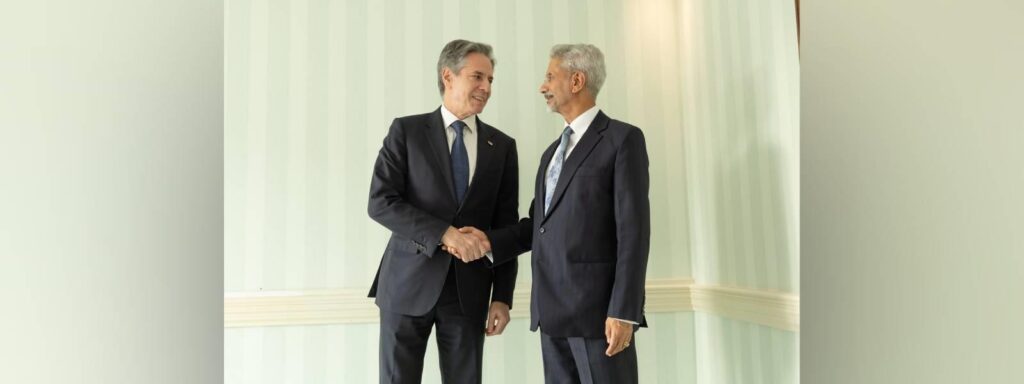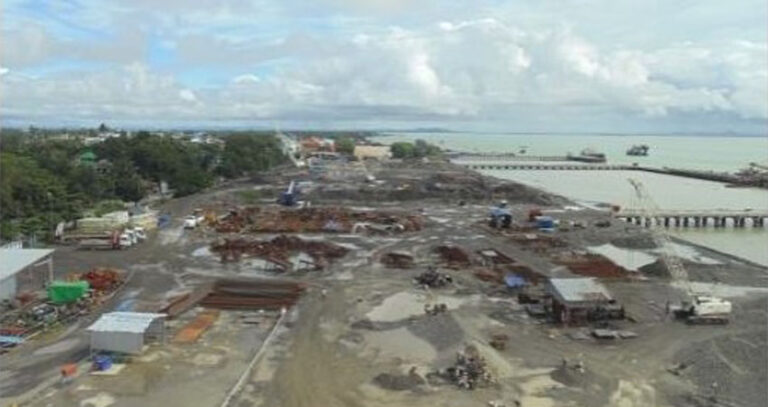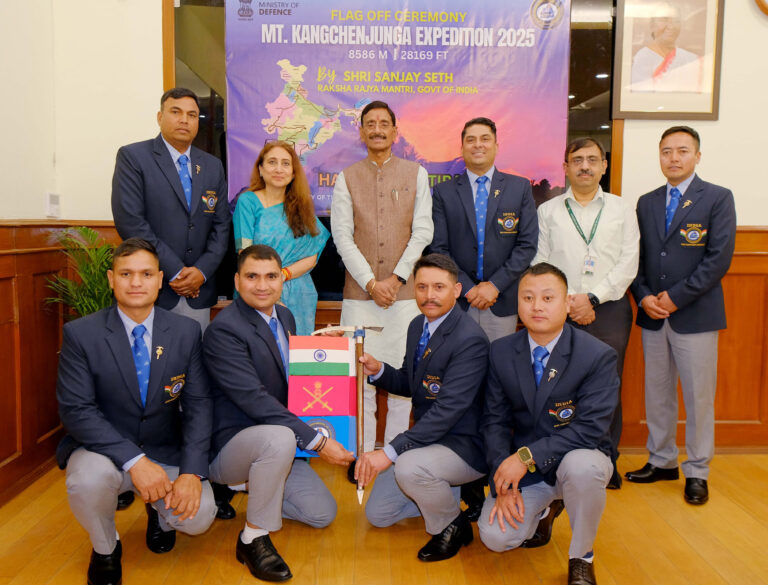
External Affairs Minister Dr S Jaishankar with his US counterpart Antony J Blinken in Munich.
Munich: Indian External Affairs Minister Dr Subrahmanyam Jaishankar was asked tough questions by the Moderator and other participants – about India’s transition from a non-aligned country to “all-alignment”. About India’s trade with Russia, the conflict in Gaza, and the rise of BRICS. The convincing replies of Jaishankar drew applause from the United States Secretary of State Antony J. Blinken, and German Foreign Minister Annalena Baerbock, along with others at the Munich Security Conference on February 17, 2024.
Following is the transcript of the question-answer session with Dr Jaishankar and others:
Moderator: Minister Jaishankar, India has more of a multiple-choice mindset. Is – would that be – would that be right? From nonalignment to – I think you may have called it or somebody else called it “all-alignment.” So you can pick and choose alliances, but you can also pick and choose topics. On Russia, for example, you still buy Russian oil. Is that okay with your counterpart from the U.S.? Everything is – your relationship is fine? You can do whatever you want whenever you want? (Laughter.)
Jaishankar: Okay. First of all —
Moderator: I mean, you’re sitting next to each other, so —
Jaishankar: No, no. First of all, delighted to be here, and I couldn’t find a better set of people to be with on the stage. So thank you for whoever put us on together.
Your question: Do we have multiple options? The answer is yes. Is that a problem? Why should it be a problem? If I’m smart enough to have multiple options, you should be admiring me, you shouldn’t be criticizing me. (Laughter and applause.)
Now, is that a problem for other people? I don’t think so. I don’t think so, certainly in this case and in that case. Because look, we try to explain what are the different pulls and pressures which countries have. And it’s very hard to have a unidimensional relationship. Now, again, different countries and different relationships have different histories. If I were to look, say, between the U.S. and Germany, it is rooted – there’s an alliance nature to it; there’s a certain history on which that relationship is grounded. In our case, it’s very different.
So I don’t want you to even inadvertently give the impression that we are purely and unsentimentally transactional. We are not. We get along with people. We believe in things, we share things, and we agree on some things. But there are times when you’re located in different places, have different levels of development, different experiences – all of that gets into it. So life is complicated. Life is differentiated. And I think it’s very important today not to reduce the entire complexity of our world into very sweeping propositions. I think that era is today behind us.
So I agree very much with what Tony said, which is good partners provide choices. Smart partners take some of those choices. But sometimes there will be choices on which you say, well, I think I’ll pass up on that one.
Moderator: It’s a very good point, which brings me to the BRICS and the rise of middle powers because that is one of the shifts that we see today. To what extent do you think that that is a challenge to the West, or maybe that can be sort of the bridge, especially in a world where we will see continued competition between the U.S. and China? And I’m going to ask Minister Jaishankar first and – but I’d love for both of you to comment as well.
Jaishankar: Yeah, I thought maybe the BRICS one you wanted the U.S. to —
Blinken: After you, Jai, please. (Laughter.)
Jaishankar: But look, again, I think it’s important to go back to how it began. The BRICS started in an era where Western dominance was very strong. The premier gathering of the world was the G7, and you had a number of significant powers in the world who felt that, well, they were not part of the G7 but maybe they also brought value to the table by sitting and discussing with others.
So in a sense, you had a collection of these countries. It was originally four; South Africa joined later. And if you look at it, it’s a very interesting group because it’s geographically as disparate as it can be. Yet it is bound by the fact that these discussions we’ve had over a decade and a half have been very useful for all of us.
Now, like any product, you test it in the market at some point. We tested it last year and asked people, so how many of you want to join BRICS? And we got almost 30 countries who were willing to join BRICS. So clearly, if 30 countries saw value in it, there must be something good we have done. So I think it’s important today to make a distinction between being non-West and anti-West. I would certainly characterize India as a country which is non-West, but which has an extremely strong relationship with Western countries getting better by the day. Not everybody else necessarily in that grouping might qualify for that description.
But the contribution the BRICS has made – if one looks at the G7 and how it evolved into the G20, I think in a way those additional 13 members who came into this bigger grouping, five of them are BRICS members. The fact that there was another group which was meeting regularly and discussing and debating I think certainly was an input into the expansion of the G7 into the G20. So I think we did a service to the world.
Blinken: I’m tempted to say what my friend said and leave it at that. Look, the – what we don’t need to do and what we’re not doing is trying to somehow design the world into rigid blocks. Each and every one of the issues that we have to deal with, and deal with in the interests of the American people, may have different collections and coalitions of countries that are focused on it, that bring certain experiences, certain capacities, and I think about it as variable geometry. We’re putting together a puzzle with collections of countries, and not just countries, organizations of different sizes and different shapes to deal with a given problem.
As Jai [Jaishankar] said, we have – and of course the fact that the relationship between our countries, I would argue, is the strongest it’s ever been, it makes no difference that India happens to be a leading member of BRICS. We’re a leading member of the G7. We have the G20 and we have a multiplicity of things that we’re doing together every single day in different ways of organizing ourselves. India and the United States working together in AUKUS, working together – I mean, excuse me, in the Quad, working together in a variety of other fora. All of this goes to the point that the complexity and the multiplicity of the challenges that we have demands that we find different ways to work together, and this shouldn’t be done on an exclusive basis.
Look, our default, of course, is to work in the first instance with fellow democracies. That’s only normal and natural. But we are not only willing, we are actively working with any country that wants to solve a particular problem and wants to do so within the context of a rules-based order. That’s the way we approach things.
Moderator: Speaking of a rule-based order, major powers today are criticized for sort of upholding the rule-based order and upholding values in certain areas but not in others, and a lot of people around the world – and particularly in the Global South but I would say not only in the Global South; even within our Western democracies – are confused. They look at what’s happening in Gaza and at the intensity of the killing, and they ask: Where are human rights? Where are these Western values? I’m sure you’re having here today and yesterday a lot of similar discussions, Minister Baerbock.
Baerbock: Yes, and they are so productive because many of them are not only speed dating but behind closed doors, very trustfully. And I think the most important job for those who believe in a rules-based international order, be it politicians, be it journalists, be it citizens, is to not be pushed into this speed dating, into this black-and-white world in all of our bubbles. Because easily – and this is a double-standard question, yeah – if you only look – and you mentioned the situation in Gaza. If I only see the whole time on YouTube what’s happening in Gaza, and I do that every second day – every day I cannot stand it because otherwise, I couldn’t get out of my bed anymore – yeah, your reality is obviously – the only thing what we can and have to do right now is to go in a total ceasefire to rescue these innocent children dying there every day. Yeah?
So, you’re 100 per cent right by that. But the question is to really come to this reality is to force myself – not myself, but all these persons who are saying this is the moral right thing to do – to then also ask: So how do we come to that? And this is then when some might ask: So why you, the German foreign minister, didn’t call for an immediate ceasefire the last – months ago? Because I also looked at the other side, at the other YouTube videos, at the other bubbles, yeah, where we saw, I saw for days after the 7th of October – I didn’t only see it, I spoke to the father whose wife and two little girls had been kidnapped by terrorists from Hamas. I saw the video where women have been not only raped but murdered afterwards. And in that moment for me it was clear, again, that we can also not only relate to the past saying, okay, we know how negotiations about – with terrorists are working. Because if you saw that video and if you were ready to see this woman suffering there, you understand that this is not only military logic. Because those people who are doing this, raping a woman and killing her afterwards, they don’t want to exchange soldiers for political prisoners. They enjoy slaughtering women.
I’m saying that because I think this is really important, bringing it down to the people. Because then you understand in this kind of situation, how do we come now to a ceasefire? That the release of hostages, the release of these women is crucial because otherwise, we can never save the children in Gaza.
So this comes all back to what my dear colleague Jaishankar has said. If we are not capable of stepping out of right or wrong, yes or no, black or white, we will in this world of dilemmas never do what our job – I would say the three of us here – is: to do all the best to rescue people. And this is why we have been working so intensively for those partners, Arab partners, in the last three months to see how we can come together for the most important point right now: freeing the hostages, having a humanitarian pause to bring in humanitarian support into Gaza, and not stopping even though the headlines are there every day: You cannot fix it anyhow.
I think the biggest favour for those who do not care for human rights and the international order is that we are giving up and that we are not being ready to look at these different topics from our different sides. And this is why – at least for me; I would say for all the three of us – use our competencies, use our channels we are having. And there again diversity is beneficial. If we are not all the same, but if we are trying to solve this horrible war in the Middle East from our different perspectives, then we can also bring security both for the people in Israel and the people in Gaza.
Blinken: I have to say I fully subscribe – (applause) – fully subscribe to everything that Annalena said. And I think as people in positions, for a brief period of time, of responsibility, but also, and maybe foremost, as human beings – as mothers, fathers, children, brothers, and sisters – we’re intensely driven to try to prevent or stop human suffering, including the suffering of men, women, and children in Gaza. The question is how to do it most effectively and how to take account of the incredible complexity that Annalena just outlined so well.
But there’s another element to this that we have a responsibility to do something about. The greatest poison in our common well is dehumanization. And we see that in all directions. And if you lose sight of the humanity of someone else, then your heart is hardened to a point where anything is acceptable and anything is possible. Part of our responsibility is to do what we can to push back, to avoid, to call out dehumanization wherever it’s coming from, in whatever direction. Because if we can’t get at that, it’s very hard, if not impossible, to do other things.
Moderator: One other criticism that I think I’m sure you hear a lot is U.S. policy has, of course, shifted in the last couple of months, but yet you want the fighting to stop, but there is no sign whatsoever that you’re not willing to send weapons to Israel, for example. So that also confuses people. When they look at the rhetoric versus the action, what would you say to that?
Blinken: Well, first, we’re committed to Israel’s security. That’s been clear from day one. It remains clear. And we understand and support the proposition that Israel has to find ways to make sure that what happened on October 7th never happens again. (Applause.) So we start there.
But we’ve also said – and not only said, we’ve acted on the proposition – that, of course, the way Israel does that matters profoundly. The way it does it is in terms of trying to ensure greater protection for civilians who are caught in the crossfire of Hamas’s making. That’s absolutely essential. Making sure that people in need get the assistance they need. We are working on this every single day. And as we’ve seen this evolve over the last four months, things have happened as a result of our engagement, our intervention, that I would say probably would not have happened, almost certainly wouldn’t have happened without it. But it’s not enough; it’s insufficient. And that’s why we’re at it almost, literally, 24 hours a day.
Baerbock: May I add one thing on that?
Moderator: What is – yes, sure.
Baerbock: Because for the full picture – and this is what we are discussing, and this is a good thing. In these horrible times, I’m always trying to see the glimpse of hope at the horizon. The good thing is that over the last three months, yeah, all these discussions were helpful in a way. First, we didn’t have any humanitarian support; now we have at least a few trucks – not enough trucks. But also from the other understanding – and this is why I totally agree with the security guarantees for Israel – you cannot just say we need a ceasefire and the Israeli government, the IDF has to stop, and then we just wait and see what happens through the regrouping of Hamas. No, we have to give an answer to both legitimate security concerns.
So our part of the discussion is, for example, in the north, yeah? If people go back to the north, how do we as an international community secure that Hamas is not regrouping there, using, misusing against civilians as a human protection shield? And this is also part of our common international security response. (Applause.)
Moderator: Minister Jaishankar, what is the view from India? What would you – if you had some advice for your colleagues, what would you be – what would you tell them?
Jaishankar: Well, I don’t have advice for my colleagues, though I – particularly, I think all of us follow the enormous efforts which Tony is putting in right now. But look, the way we look at it, there are different dimensions, different elements to this.
Number one, we must be clear that what happened on October 7th was terrorism. No caveats, no justification, no explanation. It was terrorism.
Number two, as Israel responds, it is important that Israel should be – should have been very mindful of civilian casualties, that it has an obligation to observe international humanitarian law.
Number three, the return of hostages is today imperative.
Number four, there is a need for a humanitarian corridor, a sustainable humanitarian corridor to provide relief. And eventually, there has to be a permanent fix, a long-term fix, otherwise we’re going to see a recurrence.
And I think today, suddenly – India has long believed in a two-state solution; we have maintained that position for many decades. And I think today, many more countries in the world today feel not just that a two-state solution is necessary, but it is more urgent than it was before.
– global bihari bureau





